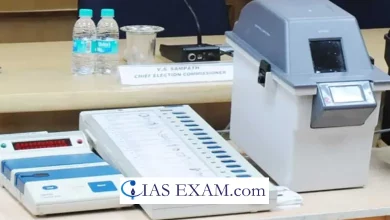Daily Current Affairs for UPSC
AFSPA Act and North Eastern States
Topic- Internal Security [GS Paper-3]
Context- The Ministry of Home Affairs (MHA) has extended the Armed Forces Special Powers Act (AFSPA) in parts of Arunachal Pradesh and Nagaland for another six months till 31st March.
Key Highlights-
- The Ministry of Home Affairs (MHA) has extended the Armed Forces (Special Powers) Act (AFSPA) in some parts of Arunachal Pradesh and Nagaland for another six months.
- Tirap, Changlang and Longding districts in Arunachal Pradesh and the areas falling within the jurisdiction of Namsai and Mahadevpur police stations in Namsai district along the Assam border, are declared as disturbed areas under Section 3 of the AFSPA 1958 for a period of six months from October 1.
- Nine districts and 16 police stations in four districts of Nagaland were also declared as “disturbed areas” after an analysis of the law and order situation in the State.
- AFSPA has been extended in Dimapur, Niuland, Chumoukedima, Mon, Kiphire, Noklak, Phek, Peren and Zunheboto districts in Nagaland and the areas in Nagaland falling within the jurisdiction of
- Khuzama, Kohima North, Kohima South, Zubza and Kezocha police stations in Kohima District;
- Mangkolemba, Mokokchung-I, Longtho, Tuli, Longchem and Anaki ‘C’ police stations in Mokokchung District;
- Yanglok police station in Longleng District;
- Bhandari, Champang, Ralan and Sungro police stations in Wokha District
- Ministry of Home Affairs had considerably decreased the number of “disturbed areas” in the States of Assam, Manipur and Nagaland.
- Currently, the periodic “disturbed area” notification has been issued in order to extend the AFSPA only for Nagaland and Arunachal Pradesh.
- The notification for Manipur and Assam has been released by the State governments.
- Tripura revoked the Act in 2015 and Meghalaya was under the AFSPA for 27 years, until it was repealed by the Ministry on April 1, 2018.
AFSPA ACT
- The Armed Forces Special Powers Ordinance was formulated by the British colonial government on 15th August, 1942 to suppress the Quit India movement.
- It put the founding stone for four ordinances, including one for the “Assam disturbed areas” invoked in 1947 to deal with Partition-induced internal security challenges.
- The Armed Forces (Assam and Manipur) Special Powers Act, 1958, followed the Assam Disturbed Areas Act of 1955 to tackle the situation arose with the uprising in the Naga Hills and adjoining areas.
- Further the previous Act was replaced by the AFSPA for broader application.
- AFSPA gives special sweeping powers to the armed forces by allowing them to open fire, even causing death, against any person in contravention to the law or carrying arms and ammunition.
- It also provides them powers to arrest individuals without warrants, on the basis of “reasonable suspicion”, and search premises without warrants.
- Under the provisions AFSPA can be imposed by the Centre or the Governor of a state, on the state or parts of it, after these areas are declared “disturbed’’ under Section 3.
- The Act has been amended in 1972 and the powers to declare an area as “disturbed” were conferred concurrently upon the Central government as well as upon the States.
- Presently the Union Home Ministry issues periodic “disturbed area” notification to extend AFSPA only for Nagaland and Arunachal Pradesh whereas the notification for Manipur and Assam is issued by the State governments.
- Tripura has abrogated the Act in 2015 and Meghalaya was under AFSPA for 27 years, until it was repealed by the MHA from 1stApril 2018.





.png)



